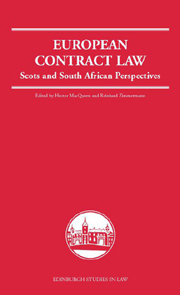Book contents
- Frontmatter
- Contents
- Preface
- List of Contributors
- List of Abbreviations
- 1 Ius Commune and the Principles of European Contract Law: Contemporary Renewal of an Old Idea
- 2 Good Faith
- 3 Offer, Acceptance, and the Moment of Contract Formation
- 4 The Battle of Forms
- 5 Agency
- 6 Threats and Excessive Benefits or Unfair Advantage
- 7 Interpretation
- 8 Third-Party Contracts
- 9 Payment
- 10 Specific Performance and Special Damages
- 11 Termination for Breach of Contract
- 12 Assignment
- 13 Capitalisation of Interest
- Appendix: The Principles of European Contract Law
- List of Cases
- Index
12 - Assignment
Published online by Cambridge University Press: 05 July 2013
- Frontmatter
- Contents
- Preface
- List of Contributors
- List of Abbreviations
- 1 Ius Commune and the Principles of European Contract Law: Contemporary Renewal of an Old Idea
- 2 Good Faith
- 3 Offer, Acceptance, and the Moment of Contract Formation
- 4 The Battle of Forms
- 5 Agency
- 6 Threats and Excessive Benefits or Unfair Advantage
- 7 Interpretation
- 8 Third-Party Contracts
- 9 Payment
- 10 Specific Performance and Special Damages
- 11 Termination for Breach of Contract
- 12 Assignment
- 13 Capitalisation of Interest
- Appendix: The Principles of European Contract Law
- List of Cases
- Index
Summary
INTRODUCTION
Throughout Europe, assignment is understood as involving a transfer of a personal right of a creditor to a third party (the assignee), the latter, replacing the former (the assignor) as creditor in respect of the related obligation. Common also is an understanding of assignment as an institution that straddles both the law of property and the law of obligations. As a disposition by a creditor of an incorporeal asset, assignment is an institution of the law of property. Because it in addition effects a substitution of creditors, assignment also reveals affinities with the law of obligations. It is accordingly not surprising that although national solutions might differ in matters of detail, comparative treatments are readily able to deal with assignment in the European context by means of a common conceptual vocabulary. The assignment regimes of the various national systems also address common concerns of policy. The need to ensure that rights are freely disposable without having to obtain the consent of the debtor is balanced by a shared concern to ensure that the debtor's position is not rendered more burdensome by the assignment. The interests of would-be assignees must also be protected against subsequent disposals by the assignor and balanced against those of creditors seeking to attach the assets of the assignor and parties interested in his insolvency. There is, accordingly, some basis for a presumptio simulitudinis in respect of the broad outlines of the European understanding of this part of law.
The assignment provisions of PECL (in Part III, Chapter 11) endeavour to provide a framework of basic, general doctrinal concepts (Grundregeln) to address similar concerns.
- Type
- Chapter
- Information
- European Contract LawScots and South African Perspectives, pp. 307 - 330Publisher: Edinburgh University PressPrint publication year: 2006



